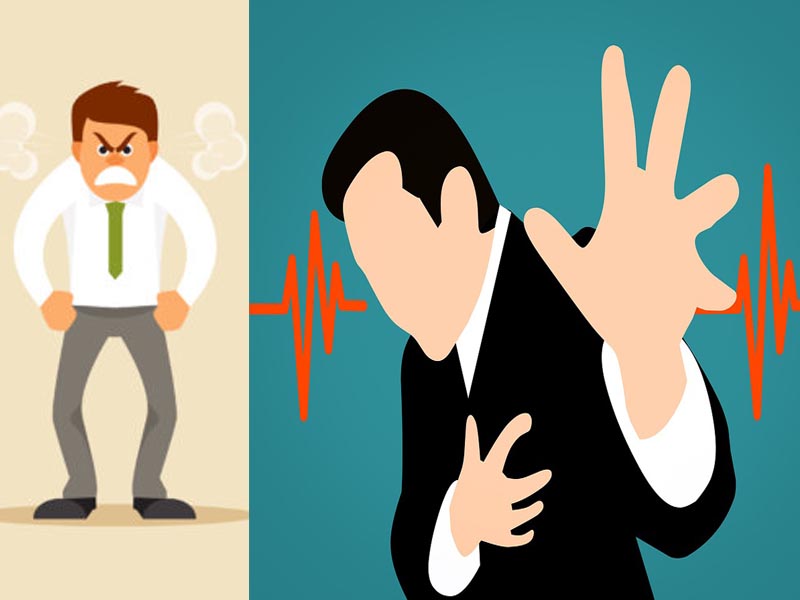If we consider coronary artery disease (CAD, disease resulting from cholesterol deposits causing blockages in the blood vessels supplying the heart muscle) as a polygamous old man, anger and hostility would probably be two of his spouses, apart from smoking, diabetes, high cholesterol, hypertension etc! Anger and hostility are known to play a major role in the clinical course of patients with CAD. Medical science has long acknowledged this fact and yet modern medicine tends to target the other latter-mentioned ‘spouses,’ that is diabetes, hypertension, etc! Why? Perhaps because there is no specific pill that one could pop to simply dissipate the feelings of anger and hostility. Could it be the stigma attached to getting therapy for the management of these feelings? After all, our society expects the male to be the lord and master of his clan, and the sight of him receiving therapy for anger and hostility would appear very “unmanly”. It’s all too easy for doctors to tell patients to “cut down on stress”, hardly realizing that this is easier said than done (“see you after 2 weeks, Mr. Singh. Oh, and do bring down your stress and try not to get angry at trifles…”)!
In today’s angst-ridden society, anger and hostility are very common, more so in the younger generation. The rising incidence of shootouts over petty issues, road rage, lynching, etc. bear testimony to how much discontent and anger simmer beneath the skin of our modern society. The craze for easy money and the good life and the subsequent failure to get it further adds fuel to the fire. All this makes for a deadly cocktail of discontent, dissatisfaction & frustration, leading to anger, hostility and an increased risk of poorer outcomes from CAD. But just how do anger and hostility cause such havoc? A study conducted in 1987 found two distinct patterns of hostility, namely neurotic hostility and expressive hostility. Neurotic hostility was marked by feelings of resentment, dissatisfaction and low self-esteem; expressive hostility by outbursts of anger, quarrels and sometimes even physical violence. It was found that an increased incidence of expressive hostility in men over 60 years of age was associated with increased incidence of CAD. Another 2008 study from the UK analyzed all previous databases of studies relevant to the issue. This found that anger and hostility were associated with increased incidence of adverse CAD events (such as strokes and heart attacks) in otherwise healthy populations.
In simple terms, if you are a healthy person and anger and hostility are a part of your personality, there is 19 percent more chance of you getting an illness associated with heart and brain (like angina, heart attack, stroke, etc.), than if you were calm and content! On the other hand, if you are a diagnosed case of CAD, the figure jumps to 24 percent. However, when these researchers eliminated the usual risk factors for CAD (e.g., smoking, hypertension) from analysis, the association vanished. This finding implied that anger and hostility increased risk for CAD only when superimposed on these other major risk factors. However, animal studies have also pointed to direct physiologic pathways like nervous system dysfunction, secretion of certain hormones and inflammatory factors during bouts of anger and hostility causing increased risk for CAD. Episodes of anger and hostility result in constriction or narrowing of the peripheral blood vessels, triggered by stress hormones secreted by the adrenal glands. This leads to an increase in the workload of the heart, that is, an increased pressure against which the heart must pump blood. In an effort to overcome the resistance, the heart muscle grows thicker and thicker. This makes the left ventricle (that pumps blood to the body) stiffer. It is obvious that in the long run, this will lead to impaired cardiac function. Such thickened heart muscle also predisposes the person to episodes of abnormal heart rhythms or ventricular arrhythmias, which may even lead to sudden death. Hence these researchers recommended the use of psychological management of anger and hostility in the prevention and treatment of CAD.
But how can we, as lay people, make anger management a part of our lives, bogged down as we are with stress (especially in the COVID era!). Without getting too technical, a few pearls of wisdom as suggested by the Mayo Clinic, USA in this regard would be in order:
- Take a ‘timeout.’ Although it may seem cliched, counting to 10 before reacting really can defuse your temper.
- Get some space. Take a break from the person who caused your anger until your frustrations subside a bit.
- Once you’re calm, express your anger. It’s healthy to express your frustration in a non confrontational way. Stewing in your own flames can make the situation worse.
- Get some exercise. Physical activity can provide an outlet for your emotions, especially if you’re about to erupt. Go for a brisk walk or a run.
- Think carefully before you say anything. Otherwise, you’re likely to say something you’ll regret. It can be helpful to write down what you want to say so that you can stick to the issues.
- Identify solutions to the situation. Instead of focusing on what made you mad, work with the person who angered you to resolve the issue at hand.
- Use ‘I’ statements when describing the problem. This will help you to avoid criticizing or placing blame, which can make the other person angry or resentful – and increase tension. For instance, say, “I’m upset you didn’t help with the housework this evening,” instead of, “You should have helped with the housework.”
- Don’t hold a grudge. If you can forgive the other person, it will help you both. Even if other person does not deserve forgiveness, you deserve peace, so forgive him. It’s unrealistic to expect everyone to behave exactly as you want.
- Use humor to release tensions. Lightening up can help diffuse tension. Don’t use sarcasm, though – it can hurt feelings and make things worse.
- Practice relaxation skills. Learning skills to relax and de-stress can also help control your temper when it may flare up. Practice deep-breathing exercises, visualize a relaxing scene, or repeat a calming word or phrase to yourself, such as “Take it easy.” Other proven ways to ease anger include listening to music, writing in a journal and gardening.

Dr. A. Kundu
Consultant Cardiac Surgeon,
National Heart Institute
New Delhi


